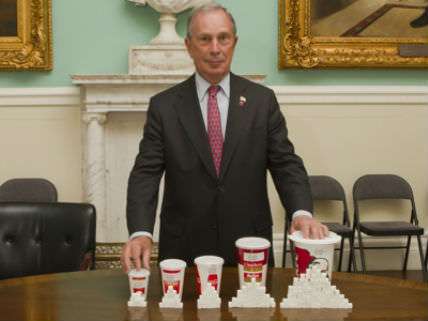Bloomberg's Tears Taste Like Mountain Dew

Yesterday New York Mayor Michael Bloomberg announced that the state's highest court has agreed to hear an appeal of the decision that overturned his big beverage ban on separation-of-powers grounds. Last July an appeals court panel agreed with Martin Tingling, a State Supreme Court judge in Manhattan, that the ban, which would have imposed a 16-ounce limit on servings of sugar-sweetened beverages sold by restaurants, food carts, and concession stands, exceeded the New York City Board of Health's legal authority. Although both decisions hinged on statutory interpretation, they also raised the deeper issue of what this "public health" is that the board is charged with protecting. Is it limited to traditional concerns such as communicable diseases, tainted food, and contaminated water, or does it extend to anything that might result in disease or injury, including voluntarily assumed risks such as those associated with drinking too much soda? Tingling and the appeals court took a relatively narrow view of the board's authority, recognizing that the broader understanding of public health would give it an open-ended license to meddle in people's lives for their own good. "To accept the respondents' interpretation of the authority granted to the Board by the New York City Charter," Tingling said, "would leave its authority to define, create, mandate and enforce limited only by its own imagination." He and the appeals court judges deemed it implausible that the legislative branch had intended to grant that kind of power to a bunch of bureaucrats appointed by the mayor.
The idea that his powers might be limited by law, even when he was using them in the service of what he considered a vitally important cause, left Bloomberg fuming. "We have a responsibility as human beings to do something, to save each other, to save the lives of ourselves, our families, our friends, and all of the rest of the people that live on God's planet," he said in response to Tingling's ruling. "And so while other people will wring their hands over the problem of sugary drinks, in New York City, we're doing something about it." Bloomberg honestly believes he is saving the world, one slightly smaller serving of soda at a time. How dare a bunch of judges interfere with that mission simply because they think he does not have the legal authority to carry it out? Bloomberg wanted reporters to know that Tingling's decision "was not a setback for me." Rather, "this is a setback for the people who are dying." He added, lest there be any misunderstanding about his paternalistic motives, "In case you hadn't noticed, I watch my diet. This is not for me." Yesteday he was slightly more restrained:
Obesity is the only major public health issue we face that is getting worse, and sugary drinks are a major driver of the crisis. The related epidemics of obesity and diabetes are killing at least 5,000 New Yorkers a year and striking hardest in black and Latino communities and low-income neighborhoods. New York City's portion cap rule would help save lives, and we are confident the Appeals Court will uphold the Board of Health's rule.
Notably absent from Bloomberg's comments about the setbacks suffered by his pint-sized pop presrciption: any explanation of why he has the authority to do what he wants to do. As with the NYPD stop-and-frisk program, he seems to think calling a policy effective or important is tantamount to showing it is legal.
Bloomberg will be out of office by the time the New York Court of Appeals is ready to hear this case, so its fate will depend on his successor. That is likely to be Bill de Blasio, the Democratic candidate, who is leading his Republican opponent, Joseph Lhota, by an absurdly wide margin in recent polls. A couple of months ago De Blasio told The New York Times he was a big fan of Bloomberg's soft drink initiative, saying, "A ban on large sugary drinks is an important part of any public health agenda." (Really? Even a public health agenda that does not encompass protecting people from their own choices?) But De Blasio is not making any promises about pressing Bloomberg's appeal. "Bill supports the ban on large sugary drinks," a spokesman for the candidate told the Times yesterday. "As mayor, he would review the status of the city's litigation."
Lhota, by contrast, had this to say about the big beverage ban at a debate in August:
I don't agree with the soda ban at all…I believe the City of New York should educate people about why sugared soda is bad for you, and people should make their own mind up. Government shouldn't tell us what to do. Government should educate us and then we make up our own mind.
Yesterday, the Times reports, Lhota "said emphatically…that if elected, he would withdraw the city's appeal, allowing the proposed regulations to die."


Show Comments (69)